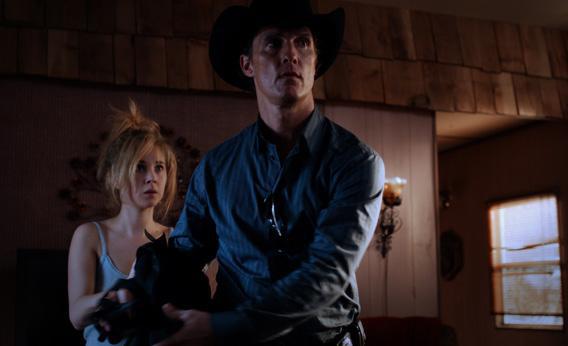William Friedkin’s Killer Joe is stylistically and thematically of a piece with his 2007 film Bug—not surprising, given that both films are adaptations of stage plays by the same author, Tracy Letts (best known for his Pulitzer Prize-winning play August: Osage County). Both Bug and Killer Joe tell the story of a charismatic psychopath who insinuates himself into the life of a down-and-out sad sack (or in Killer Joe’s case, a whole family of them), then steadily ratchets up the threat of psychological and physical violence until everyone, including the audience, is in thrall to his sick power.
In Bug, the central wackjob was played by the arresting (and then largely unknown) Michael Shannon. In Killer Joe, it’s Matthew McConaughey, who isn’t at all unknown, but who seems to have cinematically rebirthed himself in the past year or so. After turning in a fine straight dramatic lead in The Lincoln Lawyer and an uncharacteristically understated supporting performance as a small-town sheriff in Bernie, McConaughey committed grand theft movie as the strip-club owner Dallas in Magic Mike, taunting screaming female patrons in his honeyed drawl: “Can ya touch this? Can ya tooouuuch this?”
When he’s in his element—that is to say, playing powerful, charming men with Texas-sized opinions of themselves—there’s no one who can touch McConaughey, and the character of Joe Cooper, the cop-turned-hired assassin of Killer Joe, plays perfectly to the actor’s strengths. But the pleasure of watching McConaughey strut, preen, and menace his way through this Southern-fried black comedy (at least I think it’s a comedy) isn’t quite enough to save Killer Joe. The whole movie has something tonally off about it, not to mention a theatricality that works against it in a way Bug’s didn’t. Plot twists that might have played as clever onstage feel false on screen, and while the individual actors are all gifted (if in some cases miscast), they never really come together as an ensemble.
Killer Joe takes place in a small town somewhere near Dallas, but don’t look for any sociological verisimilitude here: This is a trailer-trash Texas of the mind, where too-dumb-to-live hicks inhabit rundown double-wides with a TV constantly blaring. As the movie begins, 22-year-old drug dealer Chris (Emile Hirsch) bangs on the door of his father’s trailer home, seeking shelter from a pelting rainstorm in the middle of the night. His stepmother, the slatternly Sharla (Gina Gershon) answers the door in a shirt and no pants (earning the movie its NC-17 rating in the first two minutes). After some drinking, shouting, and general berating, Chris privately confides his desperation to his father, Ansel (Thomas Haden Church): He’s in serious debt to a local drug kingpin, and his lowlife alcoholic mother has stolen the stash of coke he needed to sell to pay it off.
Chris and Ansel hatch a doomed-sounding plan to do away with the mother and collect on her $50,000 life-insurance policy, whose sole beneficiary, Chris’ virginal younger sister Dottie (Juno Temple), declares herself fully in support of the plan. But they’ll need to spend half that money paying off Joe Cooper, the police detective they’ve heard will get rid of anyone for a price.
The scene where the father and son first meet up with the contract killer in an abandoned pool hall is one of the movie’s strongest, with Hirsch and Church’s fumbling desperation bouncing off McConaughey’s impenetrable cowboy cool. Joe won’t even consider doing the dirty work without getting paid up-front, but he proposes he be allowed to deflower the nymphetlike Dottie as a retainer for his services. Chris and Ansel, having the scruples of a fungus, readily agree, and a creepy “date” is arranged between Dottie and Joe.
It’s in its first half that Killer Joe best manages to balance its precarious pileup of genre homages. The family of double-crossing murderers is straight out of classic noir, while the atmosphere of over-baked decadence recalls Tennessee Williams’ southern-gothic melodrama. Meanwhile, Hirsch and Church play a father-son team so benightedly moronic they could be refugees from a Farrelly brothers comedy. (Church’s dimwit yokel provides the movie’s biggest laughs, but the miscast Hirsch never quite manages to pass as either a rube or a dolt.) For a while it’s fun to watch Friedkin, a proven master of the genre potboiler, try his hand at combining all these disparate styles into a crazy stew. But when the movie takes a turn for the pitch-dark and gruesomely violent in the last half-hour, the audience begins to get a sense that we may have been the victims of a bait-and-switch operation.
At least this frankly lurid thriller doesn’t pull any punches—though there are a couple near the end that I wish it had. Two major characters get beaten to a pulp at close camera range, and though neither one is a likeable person (no one in this movie is, really), it’s still sickening to watch their faces turned into hamburger. The climactic (and very long) last scene is a graphic humiliation-fest involving man-on-woman violence, coerced confessions, and oral sex simulated on a leg of Kentucky Fried Chicken. As a showcase for McConaughey’s ability to turn on a dime between sweet-talk and death threats, this closing scene is a corker. In terms of dramatic resolution, though, there’s something sadistic and a little juvenile about the ending’s commitment to in-your-face excess. It’s as if Letts and Friedkin are punishing the audience for having laughed uneasily along with the black-hearted, jokey tone of what came before, conveniently forgetting that the whole sick concoction was their idea in the first place.
